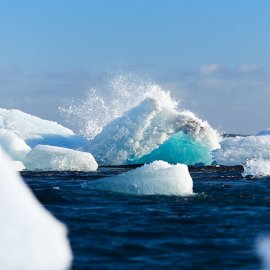Arctic Futures: How to Speak, How to Listen
-
english
-
ListenPause
Welcome to World Ocean Radio… I’m Peter Neill, Director of the World Ocean Observatory. We live in cacophonous time, language broadcasting, berating, and bewildering us at every moment in every space through every device, sending, receiving, sending, receiving… We can’t hear ourselves think much less communicate. Again and again, I realize that I must speak so many different and new languages to be understood –the languages of science, of finance, of data, of software code, of acronyms and forms of bureaucratic speak, of visual images, of abstract sounds, of dialects once thought forgotten, of gender identity, of new languages invented, and of vocabularies attempting to share ideas and values using the same words with different meanings. There is today a constant hum of chatter as if we’re all speaking at once, and the terrible irony is that, even with all the translation and transcription and best intentions, we are failing to communicate on a global scale. One such example of cross-talk is much on my mind as I work on a book about the future of the Arctic, seemingly far away and not so pertinent, but an excellent example of how good people can use the same vocabulary, repeat the same phrases, claim to be listening assiduously, and not hearing a decibel of what the other means by saying. In the circles of Arctic interest and governance, I hear a single conversation in two languages. First, there is the language of native peoples who for centuries have observed Nature as land and sea, as living among other living things, and having developed a wisdom of experience to be deeply felt, protected, and conserved as cultural value for future generations. Second, there is the language of other peoples from another place who have arrived, drawn by resources – minerals, fish, oil and gas – to be extracted and consumed, and have asserted in a different language a wisdom of exchange, export, and economic value, little of which is left behind for anyone. The single conversation centers on mutual intent, that the governance and use of natural wealth be implemented and executed for the benefit of all. But the two languages speak to a conflicting methodology and calculation of return and, no matter mutuality and intent, contradict in both process and consequence to everyone’s disappointment. What is supposed to be a constructive dialogue is actually a contradictory argument, spoken softly, mostly left unsaid. Many are vested in the best part of the conversation and I respect their determination and resilience. But many are not. Many are advancing their governmental, corporate, and institutional goals, speaking in tongues; slowly building a construct of treaties, contracts, cooperative agreements, and aspirational reports that may have no more meaning for the natural resources, the cultural traditions, or the health and well-being of communities in the Arctic than what has occurred before. Today, drilling for oil and gas is being reconsidered in Arctic waters. The extraction of uranium and other valuable minerals, on land and underwater, is being proposed with limited royalty paid. The development of tourism as an alternative source of revenue is being out-sourced to foreign capital and management. The northern sea routes are being envisioned as a means to bear witness to the beauty of the Arctic without concern for the consequence of accident or cultural compromise that will destroy that beauty. The paradox of nations declaring for solution to the global impacts of climate change while rushing to drill, extract, hunt and fish, and contribute overtly to the already compromised conditions is painful. The decline of the unique environment, the melting of sea ice and permafrost, the populations of flora and fauna, and the social distress of indigenous communities is evident to an extreme that no words can deny. How to speak? How to listen? What we have here is a failure to communicate through words with no meaning, spoken persuasively, unheard. We will discuss these issues, and more, in future editions of World Ocean Radio.
We live in an age of constant chatter, yet we are failing globally to communicate meaningfully on issues related to Arctic governance and its natural resources. In this episode of World Ocean Radio, host Peter Neill discusses the many interests in Arctic oil, gas, uranium, fisheries, tourism, trade, and transportation in a changing Arctic, and questions why a constructive dialogue between native peoples and corporate interests has yet to be formulated.
About World Ocean Radio
Peter Neill, Director of the World Ocean Observatory and host of World Ocean Radio, provides coverage of a broad spectrum of ocean issues from science and education to advocacy and exemplary projects. World Ocean Radio, a project of the World Ocean Observatory, is a weekly series of five-minute audio essays available for syndicated use at no cost by college and community radio stations worldwide.
If you value World Ocean Radio, please consider becoming a Patreon Supporter today.
Image Credit
- Login to post comments




